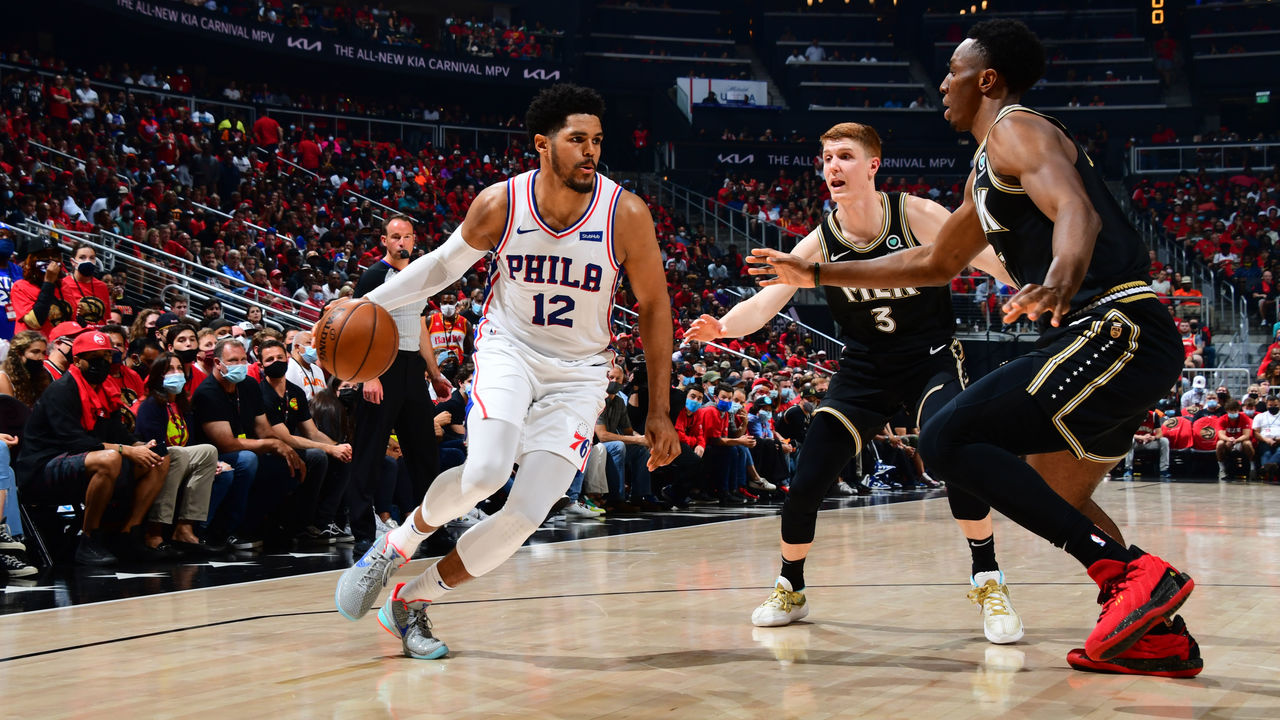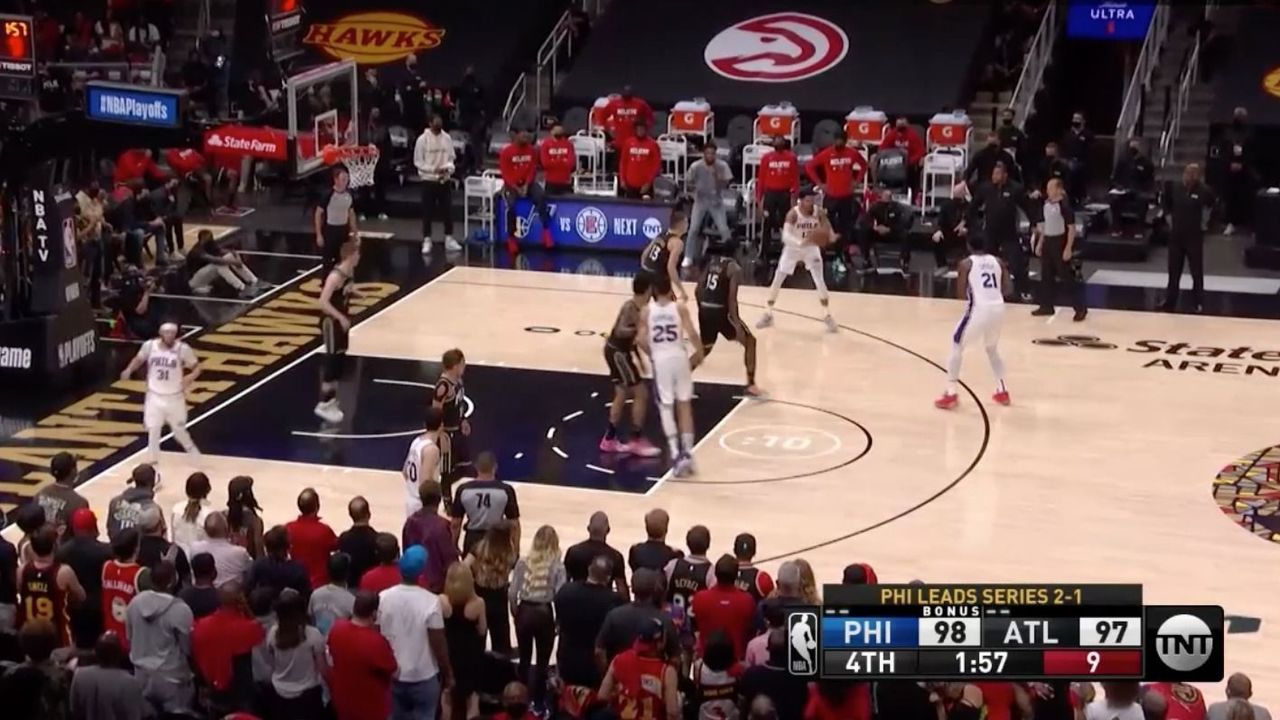Embiid isn't the only one to blame for Sixers' Game 4 collapse
Pointing to the subpar performance of the Philadelphia 76ers' franchise player would be the simplest explanation for how the team blew an 18-point lead in Game 4 of their Eastern Conference semifinal against the Atlanta Hawks.
Joel Embiid, who had been dominating the Hawks and postseason as a whole despite playing on a partially torn right meniscus, was held to 17 points on 4-of-20 shooting, including an unprecedented 0-for-12 performance in the second half.
Joel Embiid went 0-12 in the 2nd half. That's the most attempts in a half without a make over the last 25 postseasons. pic.twitter.com/MkJpGe8zK1
— Kirk Goldsberry (@kirkgoldsberry) June 15, 2021
Embiid was clearly more hampered by his knee injury Monday than he had been in previous games. The big man left the contest for the locker room at one point in the second quarter, and he admitted postgame that he simply "didn't have it" in Game 4.
The 27-year-old didn't have any lift. It's why every jumper came up short and why he seemed more interested in trying to draw fouls than actually making a basket. That foul-baiting, and lack of faith in his finishing ability, was most apparent on an ugly 3-point attempt late in the third quarter with Philadelphia up two and on the potential go-ahead basket in the final 10 seconds, which usually would've resulted in a thunderous dunk or easy layup.
Embiid obviously deserves his share of the blame, but the Sixers as a whole are equally responsible for how things played out Monday night in Atlanta.
From a coaching perspective, Embiid closing the game was questionable enough. While Philly usually can't survive without the big man, the team held up surprisingly well Monday with its MVP sidelined, which can probably be tied to the fact Embiid was somewhat of a black hole offensively.
Over a 6:06 stretch without Embiid from late in the third quarter to the 7:24 mark of the final frame, the Sixers actually outscored the Hawks 14-13 to push their lead from three to four. The defense stayed strong with Dwight Howard physically imposing his will in the paint, and the offense did just enough.
With a hobbled Embiid already being forced from the action once and having sat out longer than he usually would in a playoff game, the argument could've been made for Philadelphia to close Game 4 without the big man.
Worst case, you come home to a tied series, but with a somewhat rested Embiid. Instead, the Sixers return home with Embiid further worn down after he ran Philadelphia's offense into the ground down the stretch of Game 4.
If the thought of holding Embiid out seems ludicrous, then the way Doc Rivers and Philadelphia used him when he returned to the court was equally baffling.
Again, this was a clearly hobbled big man who just shot 0-for-7 in the third quarter and left the game once already, yet when he returned, Embiid used eight of the Sixers' final 14 possessions (a usage rate of 57.1%), going 0-for-5 with two turnovers in the process. He also used six of the team's final eight possessions over the last three and a half minutes. Even the few Philly possessions that ended in other players' hands still began with actions to get Embiid the ball.

Embiid's late-game usage and the team's over-dependence on him speak to the front office's roster construction failures and the limitations of Embiid's supporting cast, both of which have been debated and discussed ad nauseam over the last couple of years.
Ben Simmons is a defensive menace, a great playmaker, and a terror in transition, but he still can't shoot or create his own offense unless he's driving to the basket. Those limitations are why the three-time All-Star wasn't even on the court for the Sixers' final possession.
To much less fanfare, Simmons also missed an easy putback attempt after Embiid's failed layup and managed to score fewer second-half points than the star big man who didn't make a single second-half field goal.
As was the case at the trade deadline, when the Sixers reportedly didn't want to meet Toronto's asking price for Philly native Kyle Lowry, the team still sorely lacks a high-level initiator and star shot creator.
Tobias Harris is supposed to fit the bill, and to Harris' credit, he's answered the bell throughout the playoffs. But he wasn't nearly aggressive enough in Game 4, which has been an issue for the Sixers' postseason offense in the past.
The image below is a perfect example of Harris' tendency to defer and was a regular occurrence in crunch time Monday. After coming off screens from Simmons and Embiid, Harris got the ball from Embiid with a bit of runway to attack Bogdan Bogdanovic. Yet instead of forcing the action and putting pressure on the Hawks' defense, Harris immediately looked back to an ice-cold Embiid, who had space on the perimeter against a sagging Clint Capela:

Embiid ended up letting it fly from deep with eight seconds still on the shot clock and predictably came up empty.
Capela did a nice job on the play of showing Harris a crowd and recovering back to Embiid, but part of being a playoff closer and big-shot maker is solving good defenses who put you in a bind. Harris remains unwilling to show he's interested in such a role (though it should be noted he made the right basketball decision to find an open and rolling Embiid on Philly's penultimate possession).
Between Harris and shooters like Seth Curry, Furkan Korkmaz, and Shake Milton, the Sixers had enough to at least manage the final few minutes offensively, especially with a multiple possession lead. If Rivers and Co. insisted on closing with Embiid on the court, it should have been as a defensive anchor and offensive decoy. That every single possession continued to funnel through Embiid was a failure on every level.
Whether it was Rivers' play-calling, Embiid's gun-shy teammates deferring to him, or the big man's own stubbornness, everyone deserves a piece of the blame, including the front office that still hasn't found the missing piece who could've stemmed the tide in such a situation (as Jimmy Butler often did for the team two years ago).
Up nearly 20 points late in the first half, the Sixers surely had visions of a potential closeout game in front of a raucous Philly crowd Wednesday. Instead, the team returns home in a best-of-three dog fight, with Embiid playing on one leg.
Credit the Hawks' resilience, but the Sixers have no one to blame but themselves.
Joseph Casciaro is a senior writer for theScore